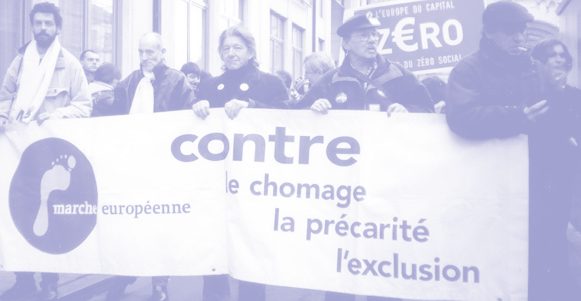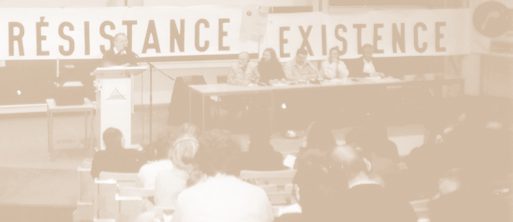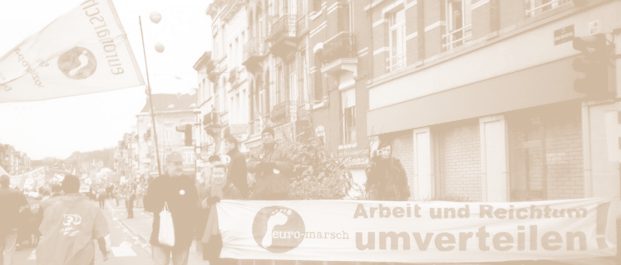

 |
 |
 |
 |
 | ||
European Marches
|
||||||||||||||
| ||||||||||||||
What in the future? |
||||||||||||||
Common social rights to every resident in the European UnionPierre Barge, General secretary of FIDH – AE general secretary of LDH 
We can only start with a certain number of assessments before we wonder about the way to participate in the construction of a social Europe in balance with a Europe of the markets. A Europe where markets competition and rights competition coexist The economic growth from 1945 to 1974 is mainly related to the growth of the domestic market of « Nation States »; in 1945, the world trade represented only 7% of the global production, it reached 15% in 1973. This growth was accompanied with the construction of a system of social rights guaranteeing social cohesion, what is commonly called the « European Social Model ». With the 1974 crisis, we witnessed the collapse of whole sections of the economy, the rise of the unemployment rates and exclusion. The economic restructurings which accompanied the economic recovery of the 80's were caused by the will of the opening of the markets and a preference for a competitive economy. The new economic growth is characterized by the increase of imports and exports of goods reaching at the beginning of this century 30% of the global production. Nethertheless, this growth has not been accompanied with a decrease of the social inequalities. In Northern countries, precariousness reaches more than 10% of the population. In Montpellier, in France, the remarkable economic dynamics of the area have not enabled the reduction of the unemployment rate which remains at 13% of the working population. There are 55 million poor and socially excluded people, people « abandoned » by the economic growth in Europe. This situation is the reflection of a globalization affecting social rights run by the setting of competition between states, which are legitimate carriers. The globalization of the economies was not accompanied by a real collective construction of social rights on a worldwide scale, nor even on a continental scale. There are definitely two international texts: the United Nations' « International Covenant on Economic, Social and Cultural rights » and the European « Social Charter » signed by a very large number of states. But pact and charter do not allow lodging protest and thus, states are not answerable on an international level. EU countries do not escape this logic of competition of rights, either on the extracommunity or on the intracommunity scale. They are all together confronted by the social competition of southern countries. They are in competition when 60% of their external trade are made between them. In reference to the « European Social Model », the development of the Europe of markets should have been accompanied in parallel with the construction of a social Europe, based on the model of what had been done in every state when growth had its origins mainly in the internal market. What happened was the contrary. Under the pressure of competition, social gains inside every state have been reappraised; the transition to the 25 members' Europe may well accelerate this process. In the countries that will join Europe, the social system is deteriorating under the effect of structural adjustment policies and privatizations. Unemployment is massive, the part of informal work is progressing, and so is rightless work. The precariousness and impoverishment of the population becomes more pronounced, discrimination and marginalization of minorities such as the Roma is exacerbated. In the integration process of these countries, more attention was given to the respect of civil and political rights than to economic and social rights. Political, civil, economic and social rights are though as any right indivisible. However, there have been opportunities to build the social Europe claimed by the European social movements. The drafting of the European charter of fundamental rights, the writing of the draft Constitutional Treaty were opportunities to give residents of the Union similar social rights and to link economic competition and rights competition. To build Europe on a basis of common fundamental rights, and then, enlarge it to new countries giving their inhabitants the same rights, isn't it building a Europe of rights from the top instead of a construction from the bottom by the competition? Acting collectively for social rights, for fundamental rights, recognized for all residents of European countries As for the leagues of defence of human rights – European association for the defence of human rights, we are involved in claiming a Europe of the Social Rights, and more largely a Europe of Rights. Rights are indeed universal, indivisible, they must be the same for all, but rights are never achieved. They are collectively built rights and their construction must be effective today, specifically at regional and international scale. At European scale, we must progress toward a Constitution in which fundamental rights would be the basis of European institutions and European citizenship would be recognized for all permanent residents, whatever their nationality. We have to express our demands but also to give ourselves means to be heard. For that, we must jointly work out proposals and demand that they are taken into account at European scale. It is then necessary to build networks and have meetings. In November 2003, we set up the European network for a democratic and Social Europe (REDS) together with several associations and trade unions. This network aims at exchanging, discuss, have a deep reflection around democracy, citizenship, social rights, equality and peace. We have several meeting at the end of May in Rome, in October in London with the ESF. We must as well organize ourselves to act jointly towards governments for European decisions are taken in the frame of the European Council of Ministers, the European Parliament and the European Commission to impose choices we would have worked out together. |
Content | |||||||||||||
|
Women and precariousness in Spain >> A European and misogynistic constitutional treaty which usurps women's conquests >> LISBON AGENDA: More and Better Jobs? >> Report of the four working groups >> 
02/08/04
|
||||||||||||||